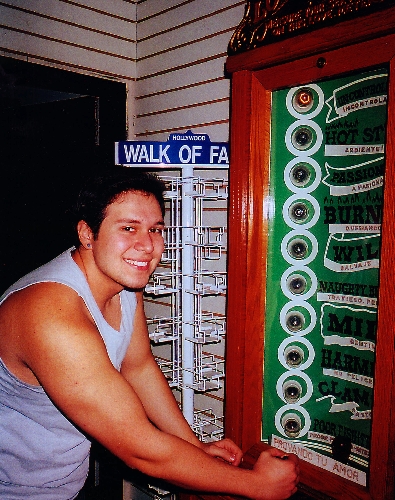OSHA not reviewing death of stagehand

State safety officials think they have significantly improved the way they hold employers accountable for on-the-job accidents, according to a Nevada Occupational Safety and Health Administration letter sent Tuesday to federal officials, who faulted a state investigation of a stagehand’s death. The 20-year-old part-time stagehand was killed in 2009 by a fall in a showroom at MGM Grand.
Meanwhile, the victim’s mother, Marychris Rodriguez, told the Las Vegas Review-Journal on Wednesday that the state’s measured response to her son’s death has left her reeling. In an interview about the letter, the head of Nevada OSHA said the agency will not reopen its accident investigation, which federal officials had criticized on several grounds.
The written reply by state officials to federal OSHA was signed by Donald Jayne, administrator for the Nevada Division of Industrial Relations. Jayne supervises Steve Coffield, the top Nevada OSHA administrator, who told the newspaper that Nevada law prevents the agency from reopening the case despite investigative flaws.
"Nevada OSHA appreciates all the (federal) recommendations and will work to implement those that have not yet been implemented," agency spokeswoman Elisabeth Daniels said Wednesday.
In the same telephone interview, Coffield said that Nevada OSHA officials made numerous improvements after a 2009 federal OSHA’s analysis of the state agency, which came out a month after Nevada OSHA had issued its citations to the hotel and Rhino Las Vegas, the rigging company Vicente Rodriguez worked for when he died.
The mother called the state’s new written response "frivolous and vanilla-coated." She said it read to her "like an elementary school child saying to the teacher, ‘I’ll do better next time.’ … But where does that leave me?"
Rodriguez said she contacted Gov. Brian Sandoval’s office last week to discuss changing state laws that govern Nevada OSHA and is awaiting a reply.
She also is searching for out-of-state representation to sue Nevada in federal court. She alleges state officials have failed to operate their agency in a way that enforces safety as stringently as federal OSHA officials do in states such as Florida, Massachusetts and Texas, which lack their own safety agencies.
Vicente Rodriguez died on May 20, 2009, less than a week after his 20th birthday. The UNLV student fell 40 feet to the showroom’s floor when trying to balance on a railing to reach a secure spot and clip in his fall-arrest line. He had taken a one-night job to help pack up equipment from singer Tom Jones’ just-ending MGM engagement.
Rodriguez was supposed to work at ground level only, a Rhino manager had agreed, according to e-mails provided to the newspaper by the Rodriguez family.
The state’s original investigation found several serious violations by the hotel and Rhino. Both negotiated to lower the number of violations and resulting monetary penalties. The hotel did pay a fine for unsafe planking, which Vicente Rodriguez was trying to reach when he fell. It also removed the planking.
Dissatisfied with the outcome, his mother appealed to federal OSHA officials, which set in motion the December federal report and the written reply from state officials.
Nevada law prevents Vicente Rodriguez’s family from suing Rhino, the hotel or state OSHA because he died in the workplace without any state finding that the first two parties were indifferent to known fall hazards in the showroom or had willfully ignored known hazards. A willful finding would have opened the door for the Clark County district attorney to review the investigation for criminal prosecution.
In their Tuesday letter, Nevada OSHA officials agreed by March 1 to spell out in their Rodriguez accident file the reasons for their finding of no willful conduct.
In the Wednesday interview, Coffield also described one portion of the federal findings about Nevada OSHA as erroneous. Contrary to the federal findings dated Dec. 23, the state inspector who handled the Rodriguez accident investigation did have the required training on how to conduct accident investigations and the legal aspects of such investigations, Nevada’s OSHA chief said.
But he confirmed that because of Nevada’s statute of limitations for OSHA violations, his staff cannot pursue several threads left dangling by the state’s closed investigation, which might have produced evidence of willfulness.
The closed investigation did not pursue, for example, Marychris Rodriguez’s assertion that on the night of the accident, the hotel and Rhino told most of the 15 to 20 stagehands who were present at the showroom to go home before the state OSHA inspector arrived. The victim’s mother alleges several stagehands have told her they were among those dismissed early.
Coffield had never heard the assertion until the Review-Journal raised it during the telephone interview on Wednesday, he said.
Nevada OSHA’s accident records show that its inspector interviewed two riggers that night. The inspector did not ask the hotel or Rhino for the names or contact information on other riggers to assess the accident’s broader context.
Nor can state OSHA officials explore why their accident inspector did not reconcile several seemingly contradictory facts.
His handwritten notes say a rigger told him that the lifeline — to which Vicente Rodriguez was trying to clip his safety harness — underwent a private maintenance inspection about a month before the fatal accident. That particular lifeline seems to serve only the unsafe planking Rodriguez was trying to reach. The year before the accident, during a comprehensive OSHA inspection of the entire MGM Grand, hotel reps said the planking in question had not been used for years.
After the accident, a rigger told the OSHA inspector that crews regularly used the planking to "load in" and "load out" equipment for Jones, who has appeared almost quarterly at the venue for years.
Contact reporter Joan Whitely at jwhitely@review journal.com or 702-383-0268.